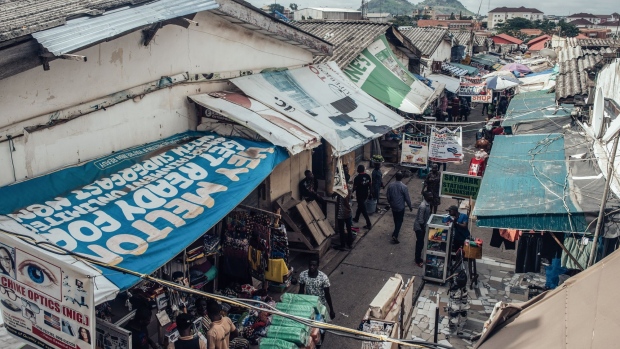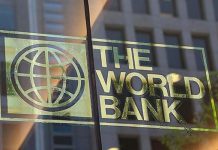Africa-Press Nigeria:
Chiemelie Ezeobi, Mary Nnah, Rebecca Ejifoma, Chiamaka Ozulumba and Oluwabunmi Fache write that the harsh economic downturn is taking its toll on ordinary Nigerians, especially with the spiraling cost of food prices
“With the current price of onions, there is no way you won’t cry when cutting it”. This was just one of the several jokes passed around last week in Nigeria over the alarming cost of foodstuff, especially staples like tomatoes, onions, pepper, rice, cooking oil, beans and yam.
In the face of the global slump in the price of crude oil in the international market and the ongoing COVID-19 pandemic, many economies are battling depression, which in turn translates to limited access to funds but increase in the cost of living. Although some may argue that Nigeria is not depressed, but things are definitely not the same anymore given the high cost of living, especially the price of foodstuffs.
Sustainable Development Goals
The Sustainable Development Goals (SDGs), also known as the Global Goals, were adopted by all United Nations Member States, of which Nigeria is a part of, in 2015 as a universal call to action to end poverty, protect the planet and ensure that all people enjoy peace and prosperity by 2030.
The 2030 Agenda comprises 17 new SDGs, which will guide policy and funding for the next 15 years, beginning with a historic pledge to end poverty. Everywhere. Permanently.
The 17 SDGs are integrated–that is because they recognise that action in one area will affect outcomes in others, and that development must balance social, economic and environmental sustainability.
Through these pledge, Nigeria is supposed to- end poverty, ensure zero hunger, good health and well-being, provide quality education, ensure gender equality, provide clean water and sanitation, provide affordable and clean energy, provide avenue for decent work and economic growth, create industry, innovation and infrastructure, reduce inequality, build sustainable cities and communities, ensure responsible consumption and production, act on climate action, ensure life below water and on land, provide peace, justice and strong institutions as well as build viable partnerships for the goals.
But five years down the line, the question that begs an answer is-how far has Nigeria gone in ending poverty while ensuring zero hunger?
Impact of COVID-19
When COVID-19 broke out globally, many opined that it would lead to economic instability and food inflation. Months down the line, those predictions have sadly proved to be true.
Across the globe, the pandemic has put global economies through the wringer, shrinking the economy, which in turn translates to reduction in the value chain of food supply.
During the heat of the pandemic, many nations shut down as lockdowns were imposed as one of the measures to curtail the spread. Inevitably, this affected the food supply and consumption chain. While the cost of foodstuff skyrocketed, the standard of living dropped in Nigeria.
Following the lockdown to flatten the curve of COVID-19 pandemic, many bemoaned the lack of access to food, as well as the promised government palliatives. This is just as they bitterly decried the sudden drastic hike in price of essential foodstuffs like rice, yam, cassava flakes (garri), beans, sachet water, fish, and meat among other things. But months down the line, has anything become different or did they go from bad to worse?
Widespread Disillusionment
From civil servants to traders, teachers, professionals and even the common man, the angst against the increase in the cost of food resonated. The reason is not far-fetched- while the cost of these were increased, none of them experienced salary increase- some were even retrenched or took pay cuts.
Indeed, 2020 is a year to remember for hardship it imposed on Nigerians. Despite the hardship pioneered by the lockdown, Nigerians in several parts of Lagos are currently undergoing a second wave of hardship with the sudden hike in food prices.
When the lockdown was eased off, things seemed to have eased off a little but like a full cycle, the chickens have come home to roost.
Across the state, tales of woe have erupted as the prices of foodstuff have gone steep, further making food a luxury for the masses.
Even those that opted for Mile 12 Market in Lagos State to buy foodstuff cheap were disappointed as the price disparity wasn’t much. Known for selling staples like onions, tomatoes, pepper, vegetables, groundnut and red oil, as well as fruits, the Mile 12 market in Lagos is also renowned for being a rallying point for wholesale.
Cost of Basic Foodstuffs
Giving a comprehensive breakdown of most foodstuff in the market at the moment,
things to know (an online platform that can be accessed at thingstoknow.com.ng), posited that food has become one of the most important commodities in the market as people’s lives depend on it.
According to the platform, while 80kg bag of Ijebu Garri costs N10,500, the 50kg bag of the white and yellow garri cost between N6,500 to N7,500. Also, five litres of palm oil costs N2,200 to N2,500 whole the 20 litres and 30 litres cost N8,800 to N9,000 and N12,800 to N13,000 respectively.
Meanwhile, 500g of Dangote, Power and Golden Penny Spaghetti cost between N200 to N250 while that of Bonita cost N250 to N300.
A big basket of sweet potato cost between N500 to N650 while the small basket cost N300 to N400; a big basket of Irish potato costs N1,900 to N2,200, while a medium and small basket cost
N1,000 to N1,300 and N500 to N700 respectively.
For unbranded groundnut oil, the five litres costs N2,300 to N2,500; the 20 and 30 litres cost N9,000 to N9,500 and N13,500 to N14,000 respectively.
Meanwhile, five litres of Wesson Oil cost N4,500 to N4,700; Kings Vegetable Oil costs N2,900 to N3,000; 3.8 litres of Mamador Vegetable Oil costs N3,000 to N3,200; and three litres of Power Vegetable Oil cost N2,400 to N2,600.
Coming to sugar, 50kg of Dangote Sugar costs N17,000 to N17, 300 while 500g of St. Louis Sugar cube and Golden Penny sugar costs N300 to N400.
A small loaf of bread costs N70 to N150; a medium size loaf costs N300 to N500; while the large loaf costs N500 to N1,000. Eggs are not left out on the price hike as a crate now goes for N1,000 to N1,300.
Meanwhile, a 50kg bag of local rice and polished rice costs N14,000 to N25,000 and N22,000 to N28,000 respectively. A five kg bag of Ofada Rice costs N2,800 to N3,500 while a 50kg bag of Ofada Rice costs N25,000 to N28,000.
Also, a 50kg bag of Mama Gold Rice, Royal Stallion Rice, Rice Master and Cap Rice cost N26,000 to N32,000, N25,500 to N31,500, N26,000 to N31,000 and N25,500 to N32,000, respectively. But a 25kg bag of Master Rice, Cap Rice, Falcon Rice cost N13,000 to N16,500, N13,000 to N17,000, and N8,000 to N10,000 respectively, while the five kg bag of Basmati Rice costs N4,000 to N4,800.
For those that buy per cup, a cup of local rice costs N800 while that of polished rice costs between N100 to N130.
For beans lovers, the steep prices are also alarming. 50kg bag of Oloyin Beans costs N30,000 to N39,000 while its 25kg bag cost N15,000 to N19,000 and a cup cost N100. Also, 50kg bag of Olotun Beans costs N29,000 to N36,000 while its 25kg bag costs N14,000 to N17,500 and a cup costs N100.
The 50kg bag of Lima Beans costs N33,000 while the 25kg bag costs N16,500 and a cup costs N110. Also, a 50kg bag of White Beans costs N32,000 while the cup costs N80. For the 50kg bag of Brown Beans, it costs N32,000 while the cup of Brown Beans cost N90.
Bringing the pricing to yams, a medium size of yam size yams cost between N400 to N500; a large size yam N500 to N1,000 while Abuja yam costs N500 to 700 for medium size and N700 to N1000 for the large size. Benue medium size yams cost N250 to N450 and N600 to N800 for the large size.







